Vaccine for the COVID-19 Virus
What you need to know!
Errol Buntuyan, M.D.
Our nation and our local Maui community have been hit hard with increased COVID positive cases in the last two months. It is undeniable the COVID-19 virus has not only affected our health but also our economy as well. Many have cared for or may have lost their stricken loved ones, others have lost their jobs due to business closures or have been furloughed with no relief in sight. The promising news is a limited number of COVID-19 vaccines have finally arrived on Maui. They became available to our frontline healthcare workers and nursing home community on December 23rd. The arrival of these vaccines signal the glimmer of hope to end the suffering many of us have experienced in 2020.
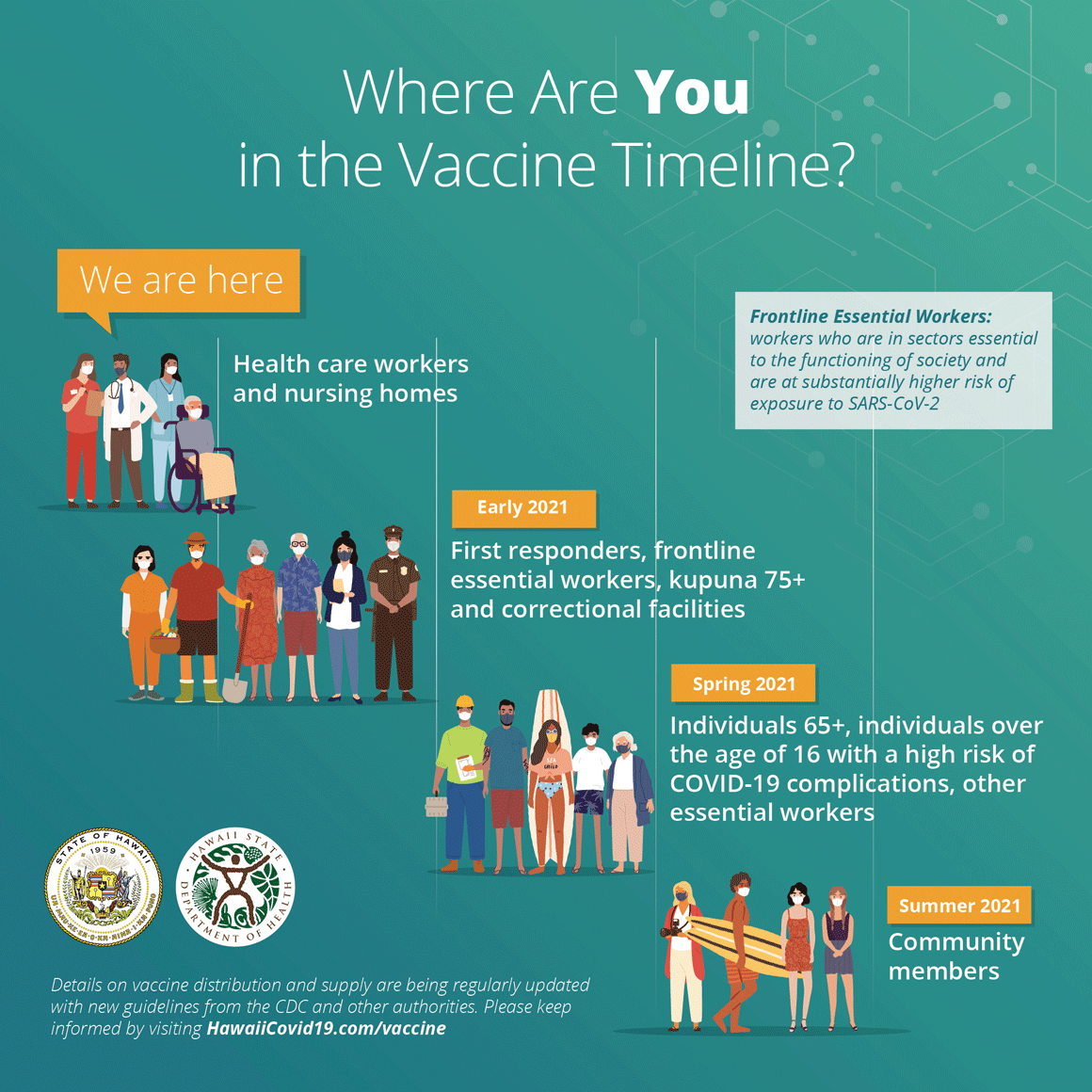
Two newly approved vaccines deemed safe are from the manufacturers Pfizer and Moderna. Though Pfizer was granted Emergency Use Authorization (EUA) by the US Food and Drug Administration (FDA) a week before the Moderna vaccine, both arrived on Maui almost at the same time. The Pfizer vaccine is being distributed at Maui Memorial Medical Center because the hospital has the deep cold freezers required for storage. The Department of Health (DOH) has received the Moderna vaccines and have distributed them at the UH Maui College campus with the help of the National Guard, Public Health teams, community nursing staff and providers. There will be continued supply and shipments in the upcoming months to other health care facilities and eventually everyone on Maui will be able to receive the vaccine.
The COVID-19 virus is mostly spread through respiratory droplets that float through the air between people who are close together, talking, breathing and coughing. There currently are no good treatments once you are sick with COVID-19. Older people or those with long standing diseases can get very sick and die from a COVID-19 infection. Although we do our best with social distancing, wearing masks and washing our hands, it is very difficult to prevent the spread of this virus. The COVID-19 vaccines are the best chance for prevention of this viral infection.
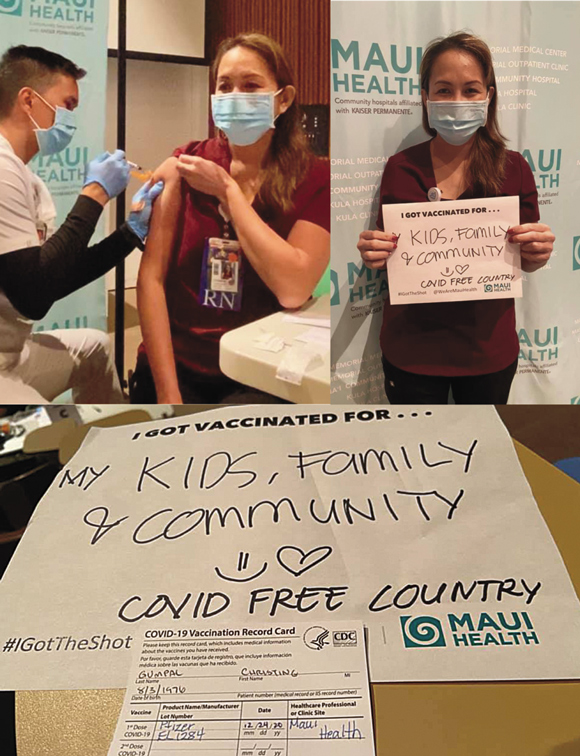
Photo courtesy Christine Gumpal
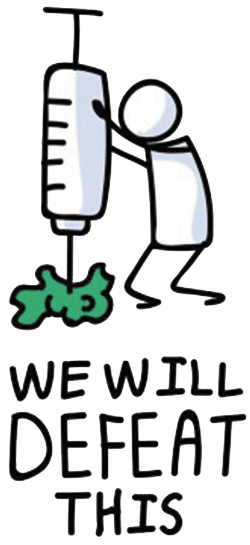
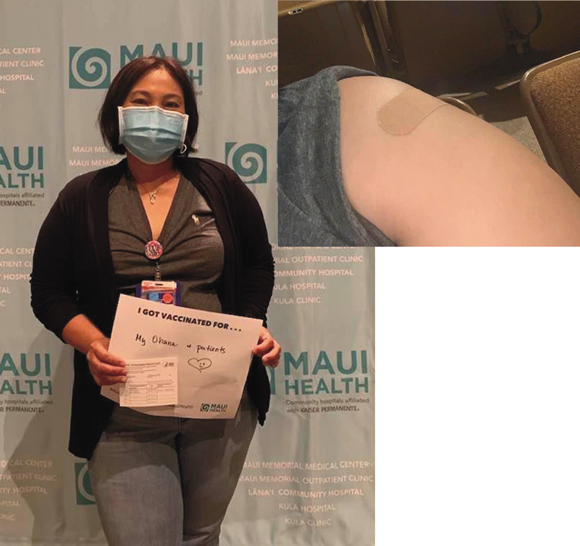
Photo courtesy Marjorie Magbual
These COVID-19 vaccines cannot give someone COVID-19. These vaccines do not use the live virus that causes COVID-19. These vaccines use mRNA to stimulate our immune system to create specific antibodies to fight against the spike proteins of the virus. This does not allow the virus to enter our cells to cause the infection in our body. Both vaccines seem to work very well with studies showing up to 95% effectiveness in preventing the recipient from getting COVID-19. It is a two-shot vaccine series given in the arm with three to four weeks between shots. The typical side effects are similar to other vaccines such as low fever, feeling tired, muscle aches, headache and a sore arm at the site of the injection. These can last one to two days after receiving the shot.
An allergic reaction could occur after receiving the vaccine. Signs of a severe allergic reaction are hives, swelling of the face and throat, difficulty breathing, a fast heartbeat, dizziness or weakness. Although this is a rare occurrence, people with known severe allergic reactions to foods, medications or other vaccines should discuss the risks with their primary care provider before getting the shot.
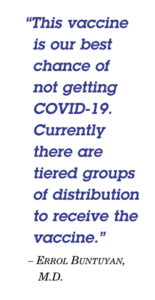 This vaccine is our best chance of not getting COVID-19. Currently there are tiered groups of distribution to receive the vaccine. Group 1a are health care workers and those residing in nursing homes that are currently receiving the vaccine. As more supplies come in we hope to vaccinate our group 1b in the next two months, which are our first responders, frontline essential workers, those kūpuna age 75 or older and those in correctional facilities. By Spring 2021, we hope to get group 1c which are individuals 65 or older, those with a high risk of COVID-19 complications over 16 years old and other essential workers. Group 2 are all community members 16 years or older that we hope to vaccinate by summer 2021. Unfortunately, we do not have a vaccine for children under 16 years of age. You may hear from your healthcare provider, your employer, announcements from State and local leaders or the media. The DOH maintains the latest information on the vaccine’s status in Hawai‘i at www.hawaiicovid19.com/vaccine.
This vaccine is our best chance of not getting COVID-19. Currently there are tiered groups of distribution to receive the vaccine. Group 1a are health care workers and those residing in nursing homes that are currently receiving the vaccine. As more supplies come in we hope to vaccinate our group 1b in the next two months, which are our first responders, frontline essential workers, those kūpuna age 75 or older and those in correctional facilities. By Spring 2021, we hope to get group 1c which are individuals 65 or older, those with a high risk of COVID-19 complications over 16 years old and other essential workers. Group 2 are all community members 16 years or older that we hope to vaccinate by summer 2021. Unfortunately, we do not have a vaccine for children under 16 years of age. You may hear from your healthcare provider, your employer, announcements from State and local leaders or the media. The DOH maintains the latest information on the vaccine’s status in Hawai‘i at www.hawaiicovid19.com/vaccine.
Please do not hesitate to get the COVID-19 vaccine when the opportunity comes your way. This will keep our Maui Filipino community safe from this deadly virus and steer us closer to the end of this pandemic.
 Errol Buntuyan, M.D. is a Family Medicine Practitioner and the Physician in Charge of Maui Primary Care at Kaiser Permanente. Born in Quezon City and raised in Southern California, he has been practicing medicine on Maui since 2007. Dr. Buntuyan promotes whole food, plant based nutrition, regular physical activity, stress mindfulness and sleep hygiene as keys to optimum health and wellness. He enjoys cooking, playing tennis and travel.
Errol Buntuyan, M.D. is a Family Medicine Practitioner and the Physician in Charge of Maui Primary Care at Kaiser Permanente. Born in Quezon City and raised in Southern California, he has been practicing medicine on Maui since 2007. Dr. Buntuyan promotes whole food, plant based nutrition, regular physical activity, stress mindfulness and sleep hygiene as keys to optimum health and wellness. He enjoys cooking, playing tennis and travel.
